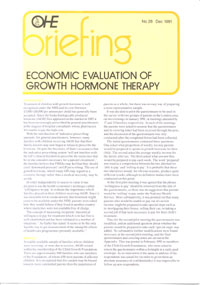Sign up to our newsletter Subscribe
Challenges and Solutions for Budget Impact Analysis of Gene Therapies

Treatment of children with growth hormone is well recognised under the NHS and its cost (between £5,000-£10,000 per annum per child) has generally been accepted. Since the biotechnologically produced hormone (rhGH) first appeared on the market in 1985 it has been increasingly prescribed…
Treatment of children with growth hormone is well recognised under the NHS and its cost (between £5,000-£10,000 per annum per child) has generally been accepted. Since the biotechnologically produced hormone (rhGH) first appeared on the market in 1985 it has been increasingly prescribed by general practitioners at the request of hospital consultants whose pharmacies felt unable to pay the high cost.
With the introduction of ‘indicative prescribing amounts’ for general practitioners, however, many families with children receiving rhGH fear that their family doctors may now begin to refuse to prescribe the hormone. Despite the Secretary of State’s assurances that the indicative prescribing system ‘will not interfere with the GP’s clinical freedom to prescribe the medicines that he or she considers necessary for a patient’s treatment’, the families believe that FHSAs may feel that they should exert ‘downward pressure’ on GP prescribing. The use of growth hormone, which many GPs may regard as a cosmetic therapy rather than a medical necessity, may be at risk.
In order independently to assess its value it was decided to use the health economist’s technique called ‘willingness-to-pay’ to evaluate the importance which families placed on their children receiving rhGH. Since it was desirable not to create anxiety that treatment might cease to be available under the NHS, parents were asked how they would behave if they lived in another country where medicines were not available free of charge.
The concept of measuring recipients’ theoretical willingness to pay for treatment which is in fact free is well established and has been validated in a number of situations. As Galler has stated ‘it seems to be the only feasible way to get measurement of the intangible effects of health care programmes presently available.
Economic Evaluation of Growth Hormone Therapy
Teeling Smith, G. and West, R.
(1991) Economic Evaluation of Growth Hormone Therapy. OHE Briefing. Available from https://www.ohe.org/publications/economic-evaluation-growth-hormone-therapy/
